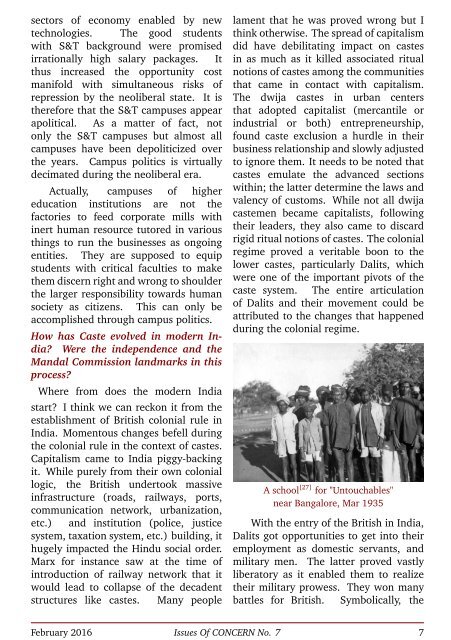ISSUES OF CONCERN
Issues_of_Concern_February_2016
Issues_of_Concern_February_2016
Create successful ePaper yourself
Turn your PDF publications into a flip-book with our unique Google optimized e-Paper software.
sectors of economy enabled by new<br />
technologies. The good students<br />
with S&T background were promised<br />
irrationally high salary packages. It<br />
thus increased the opportunity cost<br />
manifold with simultaneous risks of<br />
repression by the neoliberal state. It is<br />
therefore that the S&T campuses appear<br />
apolitical. As a matter of fact, not<br />
only the S&T campuses but almost all<br />
campuses have been depoliticized over<br />
the years. Campus politics is virtually<br />
decimated during the neoliberal era.<br />
Actually, campuses of higher<br />
education institutions are not the<br />
factories to feed corporate mills with<br />
inert human resource tutored in various<br />
things to run the businesses as ongoing<br />
entities. They are supposed to equip<br />
students with critical faculties to make<br />
them discern right and wrong to shoulder<br />
the larger responsibility towards human<br />
society as citizens. This can only be<br />
accomplished through campus politics.<br />
How has Caste evolved in modern India?<br />
Were the independence and the<br />
Mandal Commission landmarks in this<br />
process?<br />
Where from does the modern India<br />
start? I think we can reckon it from the<br />
establishment of British colonial rule in<br />
India. Momentous changes befell during<br />
the colonial rule in the context of castes.<br />
Capitalism came to India piggy-backing<br />
it. While purely from their own colonial<br />
logic, the British undertook massive<br />
infrastructure (roads, railways, ports,<br />
communication network, urbanization,<br />
etc.) and institution (police, justice<br />
system, taxation system, etc.) building, it<br />
hugely impacted the Hindu social order.<br />
Marx for instance saw at the time of<br />
introduction of railway network that it<br />
would lead to collapse of the decadent<br />
structures like castes. Many people<br />
lament that he was proved wrong but I<br />
think otherwise. The spread of capitalism<br />
did have debilitating impact on castes<br />
in as much as it killed associated ritual<br />
notions of castes among the communities<br />
that came in contact with capitalism.<br />
The dwija castes in urban centers<br />
that adopted capitalist (mercantile or<br />
industrial or both) entrepreneurship,<br />
found caste exclusion a hurdle in their<br />
business relationship and slowly adjusted<br />
to ignore them. It needs to be noted that<br />
castes emulate the advanced sections<br />
within; the latter determine the laws and<br />
valency of customs. While not all dwija<br />
castemen became capitalists, following<br />
their leaders, they also came to discard<br />
rigid ritual notions of castes. The colonial<br />
regime proved a veritable boon to the<br />
lower castes, particularly Dalits, which<br />
were one of the important pivots of the<br />
caste system. The entire articulation<br />
of Dalits and their movement could be<br />
attributed to the changes that happened<br />
during the colonial regime.<br />
A school [27] for "Untouchables"<br />
near Bangalore, Mar 1935<br />
With the entry of the British in India,<br />
Dalits got opportunities to get into their<br />
employment as domestic servants, and<br />
military men. The latter proved vastly<br />
liberatory as it enabled them to realize<br />
their military prowess. They won many<br />
battles for British. Symbolically, the<br />
February 2016 Issues Of <strong>CONCERN</strong> No. 7 7


